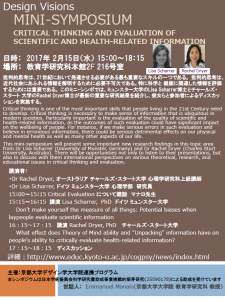デザイン学ミニ・シンポジウム「Critical thinking and evaluation of scientific and health-related information」を開催します(2017.02.15)
2017.02.06
- 学部受験生の方へ
- 大学院受験生・研究者の方へ
- 一般の皆様へ
- 在学生・卒業生
- 公開講座・シンポジウムのご案内

京都大学大学院教育学研究科・マナロ エマニュエル教授(教育認知心理学講座)が国際的に活躍されている2名の先生方をお招きして「科学と健康に関する情報に対する批判的思考と評価」をテーマにミニ・シンポジウムを開催いたします。参加費無料、参加申し込み不要です。多数の皆様のご来場をお待ち申し上げます。
| 日時 |
平成29年2月15日(水) 15:00~18:15 15:00~15:15 Critical Evaluation について概説マナロ先生 15:15~16:15 講演 Lisa Scharrer,PhD ドイツミュンスター大学 Don’t make yourself the measure of all things: Potential biases when laypeople evaluate scientific information 16:15~17:15 講演 Rachel Dryer, PhD チャールズ・スタート大学 What effect does Theory of Mind ability and “Unpacking” information have on people’s ability to critically evaluate health-related information? 17:15~18:15 ディスカッション |
| 場所 |
教育学研究科本館2階216号室 下記地図の21 |
| 詳細 | https://www.educ.kyoto-u.ac.jp/cogpsy/news/index.html |
| 参加費 | なし |
| 申込 | 不要 |
| 問合せ先 | Dr. Emmanuel MANALO メール:manalo.emmanuel.3z[at]kyoto-u.ac.jp ※[at] を@に変更してください |
|
Rachel Dryer abstract What effect does Theory of Mind ability and “Unpacking” information have on people’s ability to critically evaluate health-related information? In today’s modern society, the internet has become a popular way of accessing health-related information. However, the information available through this mass media outlet can be conflicting and can vary greatly with regards to quality, reliability and accuracy. It is left to consumers to choose among, evaluate and decide on the veracity of the information available. Previous studies have identified that both individual and task-related factors influence critical evaluation ability. One factor that has not been sufficiently examined in relation to this issue is Theory of Mind (ToM) – the ability to think about how what other people might be thinking. Given that discerning different perspectives and motivations is important in critical evaluation, ToM ability is likely to influence a person’s ability to undertake such evaluations. This talk will present the results of a study that investigated whether: (a) ToM ability has an influence on critical evaluation ability; and (b) better critical evaluations are made when the information is broken down into its key components versus when it is presented in an integrated manner (i.e., “packed” versus “unpacked”). Lisa Scharrer abstract Don’t make yourself the measure of all things: Potential biases when laypeople evaluate scientific information Making informed decisions in their daily lives or learning about science-related issues in informal settings often requires laypeople to evaluate the validity of relevant scientific or socio-scientific knowledge claims. Because they usually lack the deep-level knowledge to evaluate scientific contents directly, laypeople need to be especially careful not to engage in inadequate evaluation practices. The talk will address two biases laypeople may display when evaluating scientific information, both of which can arise when laypeople give too much weigh to their own understanding of and opinion about the subject matter: First, the ease by which science-related information can be processed affects laypeople’s confidence in their own evaluative judgment. Laypeople rely more on their judgment and are less willing to ask an expert for advice after reading information that is easy to follow than after reading information that is more difficult to understand. Second, when laypeople encounter scientific information that has ethical implications, their own ethical stance towards the issue can blind them toward a possible source bias. Empirical work will be presented on both biases, including considerations and findings about their boundary conditions. |

